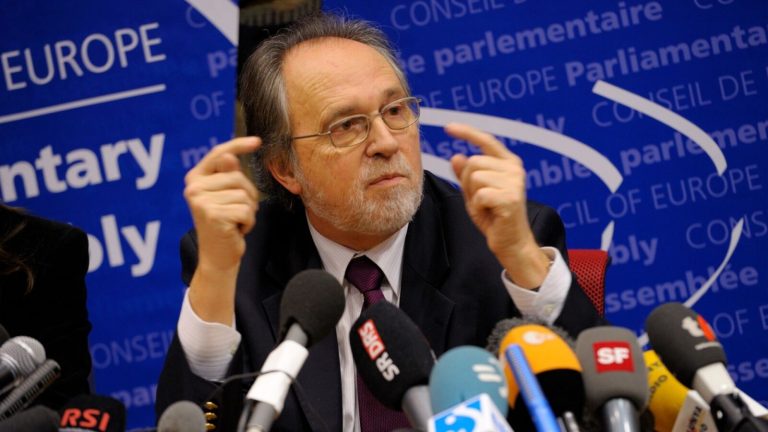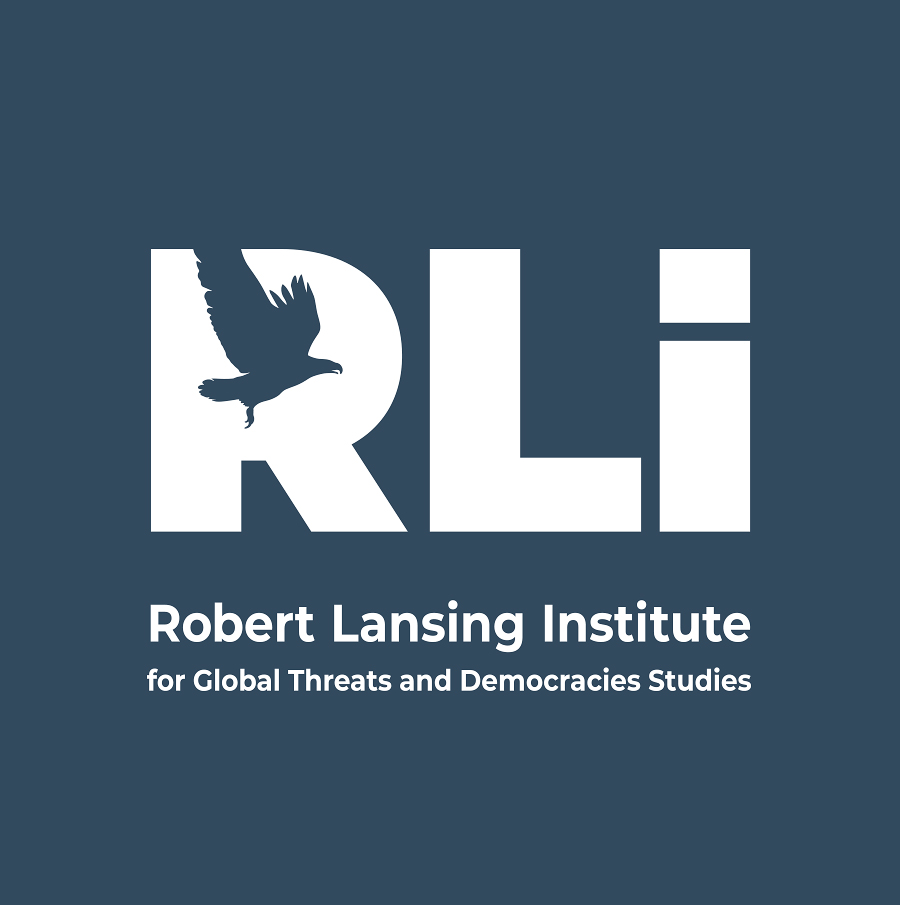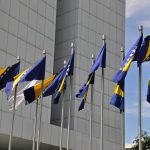The Kosovo Specialist Chambers & Specialist Prosecutor’s Office for Kosovo in The Hague were established at the persistence of the international community with the relevant constitutional changes by the Assembly of Kosovo. The Special Court as it is referred to in Kosovo is temporary and although it is a part of the judiciary in Kosovo, it operates independently and is funded by the European Union.
Its establishment follows a 2011 Council of Europe report in which Swiss Senator Dick Marty prepared which spoke about alleged crimes committed by KLA members against ethnic minorities and political opponents from January 1998 to December 2000. Dick Marty’s report accuses Kosovo political leaders of organ trafficking and other crimes committed in Kosovo and Albania. This had severely damaged the image and future of Albania from a geo-political perspective as a member of NATO and as a contender for eventual membership in the European Union. The presented evidence by Marty is also very controversial and inconclusive. A few years before the report, Gazeta Express in Kosovo published a wiretapping of an alleged member of Serbian secret service trying to buy services of a Kosovo Albanian to testify about organ harvesting scandal for the same court. This scandal was stopped by the Kosovo police but the attempt to buy witnesses is a major problem in establishing truths.

The investigation of the swiss politician, Dick Marty on organ trafficking and other crimes in Kosovo and Albania was not finding evidence even after some of his trips through the region. War crimes investigators from EULEX (European Union Justice and Justice Mission in Kosovo) also told Mr. Marty that the allegations against the authorities were a terrible “tale”. Marty, known for his “investigations” on CIA secret prisons in Europe is also known to have opposed Kosovo’s Independence and is now collaborating with Serbia in attempts to mine Kosovo statehood. Dennis McShane, a former UK minister of EU, says in a authored text in Open Democracy that “Dick Marty’s report to the Council of Europe reflects the unfortunate politicisation of that body by Russia since accession in 1995. Kosovan politics is not clean, but there is no evidence of organ trafficking by Thaçi. And Marty’s judgement is clouded by his anti-American instincts”. McShane also says that “There is not one single name or a single witness to the allegations that Thaçi was involved in the harvesting of human organs from murdered victims. That such disgusting practices happened and happen elsewhere in the world is not in doubt. But Marty fails to link Thaçi directly to organ harvesting though the lurid title of his report – “Illicit trafficking in human organs in Kosovo” – is designed to maximize headlines”. The report was initiated by Konstantin Kosachev and Mikhail Margelov, Russian MEPs along with Milos Aligrudic, MP from Serbia, Yevhen Marmazov from Ukrainian Communist party (banned since 2014) and MEP. Other MPs followed from various parliamentary groups of the European Parliament.
In 2015, Kosovo was led to believe that UN will establish an international tribunal to investigate Kosovo for the allegations. In fear of Russian influence on the UNSC, Kosovo Assembly in 2015, voted in favor of establishing a Special Court and considered its establishment as “A challenge that Kosovo must pass”. It is clear that all this was created by the extraordinary pressure exerted by the diplomatic representatives on the Kosovo institutions by asking the Kosovo Assembly to establish its own Special Court that will look at the crimes of one ethnicity only in the context of so many war crimes of Serbian military unindicted by the ICTY and other courts. Opposition political parties opposed the establishment of the Special Court on the pretext that they were not opposed to a war crimes tribunal, but demand that it be comprehensive, and not judge only the Albanian side.
Immediately after the war in Kosovo, a justice system was built by the UNMIK administration, a fragile and dysfunctional system. UNMIK, also disapproved the practice of trials in absence so most of the accused of war crimes in Kosovo, who were Serbs and managed to flee in 1999 went free. This crippled Kosovo justice system to deal with war crimes thus heavily building the distrust of Kosovo people in justice system.
The International Criminal Tribunal for the former Yugoslavia (ICTY) was set up fifteen years ago by UN Security Council Resolution 808. Thus, the Tribunal for the former Yugoslavia was a United Nations body. While the Kosovo Criminal Court is a body attached to the justice system in Kosovo. The Special Court of Kosovo was established with a constitutional amendment and a law voted in the Assembly of Kosovo which makes it an anomalistic part of justice system.
The institutions of the Special Court of Kosovo are a unique government project, which is supported by other important states and funded entirely by the EU. No member of the trial panel is Albanian, nor are the offices of the Kosovo Special Court in Kosovo, although the chambers are part of the Kosovo justice system and are attached to the Basic Court, the Court of Appeals, the Supreme Court and the Constitutional Court. Judges appointed by EULEX work in them. The Specialized Prosecutor with office in The Hague is independent of the chambers and has its own police which has equal rights with the Kosovo Police, but which does not allow the Kosovo Police to be involved in cases by the Special Court. No Kosovar Albanians work for the court whereas the court employs Serbs. The establishment of the Special Court for Kosovo is the fourth attempt to try the crimes of the Kosovo Liberation Army. From 2019 until now, about 250 former KLA soldiers traveled to The Hague for questioning by Kosovo Specialist Chambers & Specialist Prosecutor’s Office.
KLA, from ICTY to Special Court
As a military formation, the KLA was created mostly by low-middle class, unemployed and rural people but soon gained support from masses of the Albanian population of Kosovo in their efforts to defend villages that were attacked by Serbian forces.
After a decade of peaceful movement resistance in November 1993, a group of people that gathered around the idea of liberating Kosovo through armed resistance against Serbia named the group Kosovo Liberation Army. After only few years, this group became the best-known guerrilla to cooperate with the North Atlantic Treaty Organization (NATO) during the bombing campaign against Yugoslav military targets and to defend the civilian population from Serbian forces.
As a guerrilla formation was never thought it would be engaged in a frontal war with the Serbian military force. NATO Commander in Chief General Wesley Clark in his book “waging a modern war” (2001) said: “the international community had no idea about the KLA and who they were”, but after NATO started its attacks against Yugoslavia, the KLA was often providing also ground positioning coordinates of targets for bombings.
After the threat of humanitarian crisis with refugees and mass killings, in 1999, NATO intervened and Kosovo, putting the Serbian military rule over Kosovo to an end. In June 1999, Kosovo was put under the UN administration and huge civilian and military presence were in charge of both security and rule of law in Kosovo. KLA signed demilitarization and demobilization agreement with UN immediately after the deployment of NATO forces in Kosovo.
Initially under the UN Resolution 1244, the International Criminal Tribunal for former Yugoslavia (ICTY) was created to investigate all crimes committed in Kosovo. After a few indictments of senior figures of Serbian state such as Milosevic, Sainovic and others from the political elite, ICTY indicted several military figures in Serbia as well. ICTY also indicted several KLA figures. Most prominently, former prime minister Ramush Haradinaj and Fatmir Limaj, a KLA commander. Limaj was acquitted in 2007 and Haradinaj in 2012. Domestically in Kosovo, for almost a decade, UNMIK held the ties of justice sector in Kosovo. In 2001, UNMIK issued a regulation that trials for war crimes cannot be held in absentia, thus closing a chapter of dealing with war crimes in Kosovo for the crimes that were committed by Serbs who mostly fled after NATO intervention. This enabled UNMIK to proceed with accusations for crimes and war crimes against Albanians, namely against the KLA leadership for some time. Domestic prosecutors, who were paid by UN, hunted down any lead on war crimes in Kosovo and prosecuted hundreds of cases. Some of these cases were characterized by procedural errors which led to a massive disbelief in justice system led by UNMIK.
When the first glimpse of accusations against the KLA leadership came into surface in late 2000s, journalistic investigations were able to trace an attempt to buy witness testimonies by the Serbian Secret Service in Kosovo, but this was not a recent development. At the time, Gazetaexpress reported this in public. But this was not a recent development. Carla Del Ponte, a former ICTY prosecutor in Limaj and Haradinaj cases, after retiring from ICTY, published a book initially in Italian where she raises allegations for the Kosovo Liberation Army as mafia that did organ smuggling and trafficking. She had suspicions and was unable to prove them in the court of justice- but that did not prevent her from writing a book with such allegations. Dick Marty, took these allegations seriously under the sponsorship of Konstantin Kosachev and Mikhail Margelov to investigate “organ harvesting by the Kosovo Liberation Army” in Albania in so called `Yellow House´ where allegedly such operations took place. Kosachev is known to be a close ally of Leonid Slutsky, a Chairman of the State Duma Committee on International Affairs in Russian Federation.
Experts warn of the impossibility of such actions to take place in such conditions. A forensic expert from Croatia, Miljenko Doric, infamously said once that for any organ transplantation, there is a demand for high level analysis that take months and matching is a real problem. You cannot take one organ from a person and weld it to another like if it was a car exhaust. Even in cars, you have several conditions, production, mark, year, and other factors that determine matches.
Overall, what ICTY could not prove and what went through the filter of ICTY as non-argumentative, was taken by the Special Court with the Russian spin to create the accusations for the Kosovo Liberation Army leadership. Both Carla Del Ponte´s book and Dick Marty´s report went public before preparation of any accusation which makes one wonder about the objective of such. If one has facts, goes to court- any court. If one does not have facts, writes a report denying naming any source, denies speaking to the media, denies responding to any transparency, accountability or responsibility to explain the report as Dick Marty.





